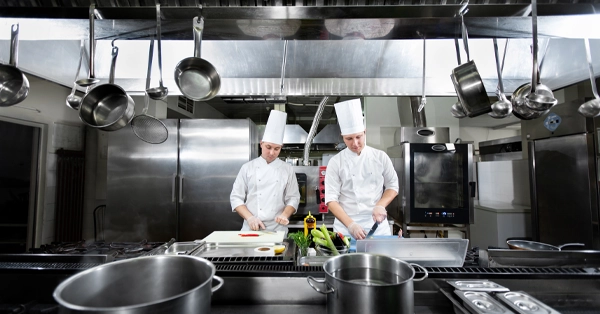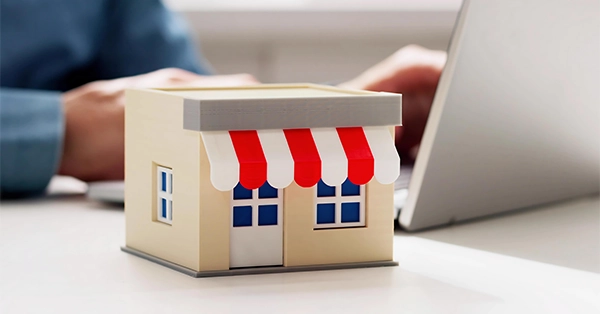Are you looking to make significant profits in the food industry in Dubai? Cloud kitchen is the key to this, as it offers a modern, cost-effective entry point to the booming UAE food delivery market. This guide outlines key steps to launch a successful cloud kitchens in Dubai.
What is a Cloud Kitchen?
Let’s first put a clear definition for the concept and then explain reasons behind adopting the idea of cloud kitchen in Dubai.
Cloud kitchens in Dubai, known as a dark kitchen or virtual kitchen, is a commercial building whose services rely solely on delivery orders, without a storefront or dining areas to receive customers for dine-in service. This distinguishes them from traditional restaurants, which offer both dine-in and delivery.
The rise of cloud kitchens in Dubai has been driven by several factors, including the Covid-19 pandemic, technological advancements, increased demand for food delivery, lower overhead costs, a focus on food quality, and a commitment to meeting customer demand and improving satisfaction.
Read more: List of Cloud Kitchens in Dubai
Key Success Factors for Cloud Kitchens in Dubai
Dubai is considered an ideal environment for the flourishing of cloud restaurants, as it combines the growing demand for delivery services of food and the availability of advanced infrastructure.
And now here is a list with the most important reasons that encourage starting a cloud kitchen in Dubai:
- Infrastructure cost savings: Lower startup costs due to no need for expensive locations or dine-in facilities.
- Expansion opportunities: Easier expansion within and outside Dubai without large investments in physical branches.
- Large audience pool: Access to a large customer base through online food delivery platforms.
- Ease of management: Simplified operations focused on food preparation, quality, and delivery, reducing administrative burdens.
- Data-driven decisions: Ability to collect and analyze customer data to inform menu and service development.
- Low risk, high profit potential: Reduced financial risk due to lower operating costs and the potential for good profits through competitive pricing and high-quality food.
By combining innovation, cost-efficiency, and data-driven strategies, the idea of cloud kitchen in Dubai represents the future of the food industry in UAE’s competitive market.

⭐ Run your kitchen, not the paperwork!
Manage invoices, calculate taxes, track expenses, and sync your inventory with mazeed accounting software so you can focus on running your Kitchen.
Why to Open a Cloud Kitchen in Dubai?
Given the fierce competition in the traditional food service industry, entrepreneurs are looking for fresh approaches. Cloud kitchens in Dubai offer a flexible business model.
Cloud kitchens in Dubai represent a cutting-edge approach to the food industry. In the following lines, you will find a guide that will provide you with the crucial steps to successfully launch your cloud kitchen in Dubai.
1st Step: Feasibility Study
A deep understanding of the Emirati market is the cornerstone of any successful venture, and this is especially true for cloud kitchens in Dubai, where the food delivery sector is experiencing rapid growth.
Therefore, there are two essential phases before launching a successful cloud kitchen in Dubai:
Phase 1: Market Analysis and Target Audience Identification:
- Competitor analysis: Understanding the local competition, their strengths and weaknesses, the types of cuisine they offer, and their pricing, considering both direct and indirect competitors.
- Demand assessment: Determining the demand for the type of food the kitchen will offer, researching market trends and identifying potential gaps to exploit.
- Target audience identification: Defining the target customer segments (youth, families, professionals, etc.) and understanding their needs and preferences, using tools such as surveys, online research, and demographic data analysis. And searching for your “unique selling proposition” or the distinct element of your kitchen.
Phase 2: Developing a Detailed Business Plan:
- Budgeting: Determining the costs (setup, operations, marketing) and sources of funding (personal, bank loans, investors).
- Resource Allocation: Identifying the resources required (raw materials, equipment, staff, technology).
- Marketing plan development: Defining marketing channels (social media, online advertising, delivery apps), developing a branding strategy (identity, logo, values, message), and choosing a business name that complies with Department of Economic Development’s regulations.
2nd Step: Location Selection
Choosing the right location is one of the most important decisions a cloud kitchen owner makes, even though there is no customer-facing storefront.
There are several criteria to consider when choosing a location for your cloud kitchen in Dubai:
- Easy access for delivery companies: Ensures fast and efficient delivery.
- Reasonable rental cost: Fits within budget; balance accessibility with cost, prioritizing proximity to high-demand areas (commercial/residential).
- Suitable infrastructure: Adequate electricity, water, sanitation, and high-speed internet.
- Proximity to main roads: Facilitates delivery vehicle movement and reduces delivery time.
- Available parking spaces: Eases order pick-up for delivery drivers.
- Appropriate space: Matches expected workload and staff numbers.
- Compliance with health and safety standards: Meets all approved Dubai standards.
Dubai currently is witnessing significant growth in the cloud kitchen sector, and there are several areas within the city that are considered promising for this type of project.
At the UAE level, Abu Dhabi, especially Al Reem Island, Al Maryah Island, Sharjah, Al Ain, and Ras Al Khaimah are also considered promising areas, due to their high population density and continuous infrastructure development.
3rd Step: Licensing and Registration
The licensing and registration process involves two stages. The first is obtaining the necessary licenses to launch your cloud kitchen project in the UAE, which will lead you to the second stage
The second stage is focused on registering on electronic platforms to reach your customers from various segments.
Types of Licenses in UAE
In the UAE, there are two main types of licenses that must be obtained to operate a cloud kitchen:
1- Trade license: The Department of Economic Development (DED) in each emirate is responsible for issuing commercial licenses, such as the Dubai DED.
It can also be issued through other channels such as the “Invest in Dubai” platform, the DED’s website, or even by visiting the DED’s service centers.
You should note that Dubai has innovated what is called the “Trader License” option, which is specifically designed for e-commerce and may be suitable for cloud kitchens in Dubai due to their reliance on electronic platforms.
Therefore, it is important to check with the DED to determine if a Trader License is the most appropriate option for your specific business model.
2- Food license (Food establishment license): This is issued by the local municipalities in each emirate, such as Dubai Municipality or the Abu Dhabi Agriculture and Food Safety Authority. It focuses on meeting specific standards related to kitchen design, equipment, hygiene practices, and staff training.
As for the second stage which is registering on electronic platforms, it is considered your gateway to customers, and therefore you must do the following:
- Registering with popular food delivery apps (such as Talabat, Careem, and Deliveroo) is essential to reach customers and receive orders.
- You must consider the terms and conditions, fees, and commissions of each platform.
- Creating an attractive profile with high-quality photos and a clear menu helps increase sales.
4th Step: Cloud Kitchen’s Infrastructure
A strong and effective infrastructure is vital for the success of any cloud kitchens in Dubai, as operations heavily rely on technology and precise organization.
The most essential elements of this infrastructure include:
- High-speed internet connectivity: Essential for managing orders, communicating with customers, and coordinating with delivery companies. Any interruption or slowdown negatively impacts customer experience.
- Order management system: An integrated system for efficient order management, tracking sales and inventory, with the possibility of integrating remote monitoring systems.
- Insurance: Financial protection for the kitchen and employees in cases of emergencies and accidents.
5th Step: Kitchen Design and Staffing
This phase of setting up a cloud kitchens in Dubai involves two key steps: kitchen design and staff recruitment.
Kitchen Design & Setup: Focuses on:
- Efficient workflow: Optimizing layout for smooth operations from storage to packaging.
- Quality equipment: Selecting high-quality, efficient appliances for food preparation and packaging.
- Effective packaging: Choosing materials that maintain food quality and presentation.
Staff Recruitment: Focuses on:
- Appropriate staffing levels: Determining the right number of staff for each role based on workload and menu.
- Skilled chefs: Hiring experienced and efficient chefs.
- Comprehensive training: Training staff on quality, food safety, and kitchen procedures.
- Reliable delivery: Partnering with delivery services or managing in-house delivery.
In essence, a successful cloud kitchens in Dubai requires a well-planned and equipped kitchen, qualified and trained staff, and a reliable delivery system.
6th Step: Cloud Kitchen Marketing
Effective cloud kitchen marketing in Dubai hinges on four key areas:
- Strong branding: Developing a distinctive visual identity (logo, colors, fonts) reflecting food and service quality.
- Robust online presence: Creating a professional website, engaging social media content, and utilizing content marketing (articles, blogs).
- Attractive promotions: Offering discounts and deals to attract new and retain existing customers.
- Strategic partnerships: Collaborating with delivery apps (Talabat, Careem) and digital influencers to expand reach.
⭐ Grow Your Cloud Kitchen with mazeed!
mazeed combines easy-to-use accounting software with certified experts to keep your business compliant and ready to scale.
Cloud Kitchen Dubai Rent
Rent is one of the most important expenses for any cloud kitchens in Dubai. The cost can vary widely depending on location, size, type of facility, and included services.
Below is a practical breakdown of what drives the rent and current market examples with reliable sources you can check.
Read more: Food Truck Business in Dubai
Average Cloud Kitchen Rent Ranges (2025)
| Kitchen Type / Size | Location | Approx. Rent |
| Shared kitchen workstation (~200 sq ft) | Al Quoz Industrial Area 3 | AED 7,000/month (≈ AED 84,000/year) |
| Dedicated central kitchen (~3,000 sq ft) | Al Quoz | AED 13,000/month (≈ AED 156,000/year) |
| Mid-size standalone (~5,000 sq ft) | Al Quoz Industrial Area 1 | AED 26,000/month (≈ AED 312,000/year) |
| Large warehouse-scale (17,800 sq ft turnkey) | Dubai Investment Park 2 | AED 1,050,000/year (≈ AED 58.9 / sq ft / year) |
Tip: For startups, shared kitchens or smaller dedicated units are often the most budget-friendly entry points.
Factors That Affect Cloud Kitchen Rent
- Location & Delivery Radius – Prime demand zones (Business Bay, Marina, JLT) tend to be pricier than industrial areas (Al Quoz, DIP).
- Shared vs. Standalone – Shared kitchens offer lower rent and included utilities but less control.
- Kitchen Size & Power Load – Bigger kitchens require higher power, storage, and ventilation capacity.
- Fit-Out & Equipment – Ready-to-use turnkey kitchens cost more than shell-and-core spaces.
- Utilities & Services – Check whether DEWA bills, gas, waste disposal, pest control, and maintenance are included or separate.
- Lease Terms – Deposits, annual escalations, and service charges can add to the total yearly cost.
Key Takeaways: Cloud Kitchens in Dubai
Starting a cloud kitchen in Dubai can be a game-changer for food entrepreneurs, but success depends on smart planning and execution. From choosing the right location to meeting legal requirements and building a strong online presence, every step plays a crucial role in keeping costs low and operations smooth.
- Focus on locations that balance affordable rent with high delivery demand.
- Get the necessary licenses and meet health & safety standards.
- Invest in efficient kitchen layouts and digital tools to streamline orders.
- Build a strong brand and online marketing strategy to boost visibility.
- Start lean in shared kitchens before moving to your own facility.
By prioritizing these essentials, you can launch and grow a cloud kitchen that’s both profitable and scalable in Dubai’s thriving food delivery market.
FAQs: Cloud Kitchens in Dubai
How much does a cloud kitchen cost in Dubai?
The cost of setting up a cloud kitchen in Dubai typically ranges from AED 50,000 to AED 200,000, depending on the size of the space, location, licenses, equipment, and technology used.
Is cloud kitchen profitable in Dubai?
Yes, cloud kitchens can be highly profitable in Dubai due to the city’s strong food delivery market, lower overhead costs compared to dine-in restaurants, and increasing demand for online food orders.
What is cloud kitchen in the UAE?
A cloud kitchen in the UAE is a commercial kitchen designed exclusively for preparing food for delivery. It has no dine-in area and operates primarily through online food delivery platforms.
How to make a cloud kitchen in Dubai?
To start a cloud kitchen in Dubai, you need to choose a suitable location or rent a shared kitchen, obtain a trade license and food safety approvals, invest in kitchen equipment, partner with delivery platforms like Talabat or Deliveroo, and build an online presence to reach customers.
Is cloud kitchen legal in the UAE?
Yes, cloud kitchens are legal in the UAE as long as they are licensed by the Department of Economic Development or a relevant free zone and comply with food safety regulations.
Is cloud kitchen profitable?
Cloud kitchens are generally profitable because they save on costs such as rent, décor, and staffing, focusing mainly on delivery services to meet the growing demand for online food orders.
How much investment is needed for cloud kitchen?
The initial investment for a cloud kitchen usually starts at around AED 50,000 for a basic shared kitchen and can go up to AED 200,000 or more for fully equipped and branded setups.
Can I invest in CloudKitchens?
Yes, you can invest in CloudKitchens either by launching your own food brand within a cloud kitchen facility or by partnering with existing operators offering franchise or partnership opportunities.
Who owns CloudKitchens?
CloudKitchens is owned by Travis Kalanick, the former CEO and co-founder of Uber.
Is CloudKitchens failing?
CloudKitchens has faced challenges in some markets due to competition and operational hurdles but continues to operate globally and expand delivery-only kitchen services.
Where is TK from Uber now?
Travis Kalanick, also known as TK, is now the CEO of CloudKitchens, leading its global expansion in delivery-only kitchen operations.
Who uses cloud kitchen?
Cloud kitchens are used by restaurant owners, catering businesses, food delivery startups, and homegrown food brands aiming to grow their delivery services without the cost of running dine-in restaurants.




